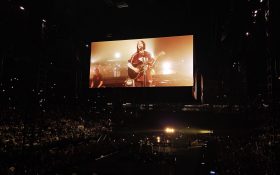Stereotyping is lazy thinking, something we all know when it comes to gender, race or religion. But we seem to fall by the wayside when it comes to age. Loudly decrying the laziness of Gen Y seems to be some people’s favourite pastime, and when it comes to programming, assumptions based on age can lead you into dangerous territory.
It is true that certain age groups generally prefer certain types of arts programming to others. We know that younger people are more interested in music festivals and those over 55, according to research by the Australia Council, make up 34 per cent of classical music audiences.
While these statistics sometimes back up the stereotype, at least in a generalist way of giving an overall sense of audience demographic, it is better instead to program based on quality, forward thinking work that will – if you get it right – attract audiences of all ages. Most programmers already know this and are aware that while certain shows can be targeted to a certain demographic – for example, Menopause the Musical – rarely will you find an entire festival, or major theatre company program, scheduled around age rather than craft.
But it may be difficult for artistic directors and other programmers to resist the allure of the grey wave of potential performing arts bucks. The population aged 65 years and over is, according to the Australian Bureau of Statistics, expected to grow to 18-19% by 2021 and to 26-28% by 2051, yet relying too heavily on this fact is problematic for a number of reasons.
Older age cohorts do make up, according to the 2008 Anticipating change study by the Australia Council, the majority of subscribers and attendees to performing arts, and the ‘increase in the demographic group has been the cause of optimism in the sector.’
Yet the study also warns that relying on this growth should be done carefully. Many retirees prefer other activities, such as reading, gardening and catching up with friends and while it is true that they have more free time, according to the study, they spend less time than younger people participating in social activities or visiting cultural venues.
Those who retire at a younger age may also be seen as a potential target audience for major performing arts companies, but the research warns against relying on them too heavily as well. Whilst wealthy, both in cash and time, the younger retiree may often prefer to pursue more ambitious activities, such as travel – meaning their cultural time may be spent at an overseas venue rather than an Australian one.
The one exception where age programming ostensibly appears to work is the contemporary music festival, and even though programmers here can largely pick and choose based on what “the youth” are listening to on triple j, they risk a lack of diversity by choosing to program only the hottest bands instead of the best quality bands, especially if longevity is the ultimate goal.
If you look at some of the more successful long term music festivals, such as Glastonbury in the United Kingdom, you will see that programmers make their choices based around the music tastes of a number of generations, putting the Rolling Stones or Blur on the same stage as Jay Z.
A less successful festival, Harvest, which was cancelled recently due to poor ticket sales did appear to program in just that way, trying to capture the 90s kids, by bringing in music they could enjoy – this backfired, badly. While letting age play too big a part in their programming wasn’t the sole cause of the festival’s collapse, restricting the audience in that way is likely to have played a part.
Something like the Port Fairy Folk festival or the East Coast Blues and Roots festival have also tried to capture this older demographic, but have appeared to realise that limiting themselves in this way can prove unsuccessful and thus pepper their program with artists who appeal to a younger demographic, as well as those with appeal across a wide range of ages. Both festivals each have a strong local contingent, and a routine place on the festival landscape to fall back on.
When it comes down to it the crux of the matter is, we don’t all like the same things. Will McRostie is a 22-year-old writer, performer and commentator puts it best when he says ‘Pandering to one demographic in programming is a death sentence.’
‘Boomers like good work as much as everyone else. The idea that they have specific tastes that need massaging is a fallacy.’
Image: Rolling Stones at Glastonbury earlier this year. Image by Kewl Kela





